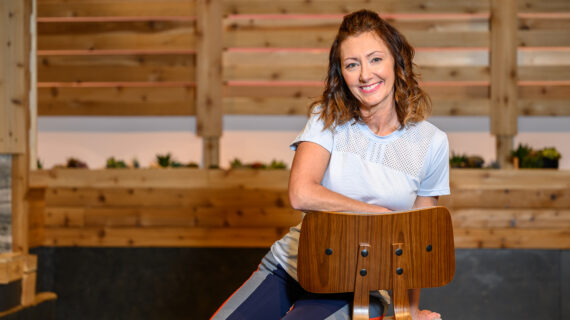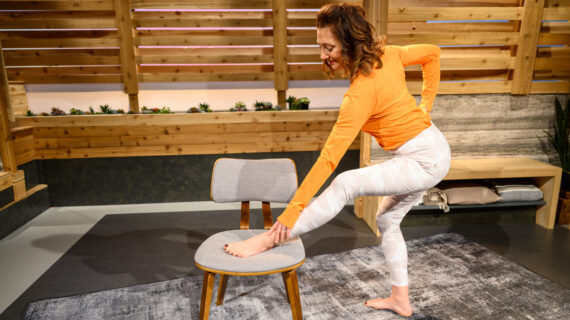Announcer:
The following program is a PBS Wisconsin original production.
Frederica Freyberg:
I’m Frederica Freyberg. Tonight on “Here & Now,” a check-in with Governor Tony Evers as Wisconsin endures another week of record-setting COVID numbers. Also tonight, what those numbers mean to the Wisconsin Tavern League and to patrons heading to the bar. And the latest on the impact of COVID-19 on health care coverage and those who need it. Plus members of the Boys & Girls Club of Dane County hand out 15,000 masks to those in need. It’s “Here & Now” for July 17.
Announcer:
Funding for “Here & Now” is provided by the Focus Fund for Journalism and Friends of PBS Wisconsin.
Crowd:
Four more years!
Frederica Freyberg:
Vice President Mike Pence spent the day campaigning in Wisconsin. First with an appearance at Ripon College followed by a dairy farm visit in Onalaska.
Mike Pence:
President Trump took unprecedented action. He put the health and safety of America first from the very earliest days. Before the month of January was over, the president suspended all travel from China, set up the White House coronavirus task force.
Frederica Freyberg:
Pence’s visit here happens the same week that Dane County and the city of Milwaukee started mandatory mask ordinances. Residents not wearing masks in public, indoor spaces are subject to fines. All of this as Wisconsin’s positive COVID cases continue to spike at a record rate.
The daily case counts this week hit record highs rising into the 900s. State Epidemiologist Ryan Westergaard Thursday saying the epidemic indicators are mostly bad and potentially getting worse. Here’s what Health Secretary-designee Andrea Palm had to say about the rising numbers.
Andrea Palm:
These numbers are not the result of more testing. Our percent positive remains high and these numbers are the result of significant community spread here in Wisconsin. What does that mean? It means we need to double down on protecting our families and our communities. It means staying home and limiting our trips to the essentials.
Frederica Freyberg:
That was Health Secretary-designee Andrea Palm. We’re joined now by Governor Tony Evers for the latest on the pandemic’s grip on Wisconsin. Governor Evers, thanks very much for joining us.
Tony Evers:
Thank you, Frederica.
Frederica Freyberg:
What words do you have for the people of Wisconsin as we experience now a record surge in COVID-19 cases?
Tony Evers:
Yeah. The words are we are not in the best place possible, frankly, as it relates to COVID-19. We’re having some surges around the state. And the time is now. The time is now. You know, school districts making plans for this fall. Lots of things that are happening in the state. And whatever we can do to drive down those numbers is going to be — pay off and it’s about real simple stuff. It’s about masks. It’s about making sure that we’re socially distant. Avoid places where you’re going to be crammed into a small place with a whole bunch of people. A lot of them don’t have masks. That’s probably not a real good thing to do. So it’s the simple stuff that we’re really encouraging people to be careful at this point in time. We have to change the direction.
Frederica Freyberg:
How ready are you to try to impose a statewide mask mandate as other states have now done?
Tony Evers:
Well, certainly the Republicans and their allies on the Supreme Court did what they did, and the ability for me to do that is questionable. So we continue to consider that, but at this point in time, you know, the Republicans, at least publicly, have said they have no interest in this. I know just this last week, the Senate leader was talking that under no way that we’d do this. So we’re working to make sure that people get — we get the word out. And certainly the corporate world has stepped up, with lots of retailing places saying, hey, we’re going to do that and we’re encouraging the people that got money from WEDC to do that. So we’re trying to work that angle. But at the end of the day, whether we did an order or not and whether that order would be found to be valid or not, it’s up to individuals to do this. And individuals really need to step up.
Frederica Freyberg:
We know that Madison and Milwaukee and potentially other districts will start the school year virtually. How safe do you think it is to reopen schools and universities?
Tony Evers:
Well, in certain places, I consider them open if they’re offering instruction. And so virtual opening is okay as long as there’s a pathway towards in-person. We have to have that pathway there. And there will be places in the state that — in the K-12 world that it’s going to be just fine. So I know it’s individual decision-making, but at this point in time, I think that our schools and our universities are doing a good job thinking through this.
Frederica Freyberg:
We learned today the Potawatomi casino will permanently lay off more than 1,000 employees. There are worries about the extra unemployment benefits ending and utility shut-offs and evictions. What can you do about any of that?
Tony Evers:
We have to do the right thing. The idea that people that are deserving of unemployment funds are not getting them, that’s just unacceptable. And so we’re working really hard to do that. In addition, we’re working with the PSC and others to make sure that people that are, you know, having their electricity and utilities turned off have options to provide them with that. So absolutely. That is the most important part of this. It’s the human, frankly, carnage in some respects that this virus has laid at our doorstep. We have to respond and respond appropriately.
Frederica Freyberg:
You met over this week with Vice President Mike Pence. What did he tell you about what kind of financial help might be coming to states and when?
Tony Evers:
Well, he indicated that the Trump administration, when they go through the next go-around of CARES funding, would provide — or they’re interested in providing some money for education, to make sure that they have the money to do what they need to open safely. And that’s great. That’s really good news. But, frankly, we also need money for the state and the counties and the municipalities, too. The revenue loss has been significant, and if that money isn’t provided to us, it’s going to hurt school districts, it’s going to hurt municipalities and counties. So it’s really important for them to step up. And I think something will happen, but it’s — you know, it’s part of the Washington politics. Who knows what’s going to happen?
Frederica Freyberg:
Governor Evers, we need to leave it there. Thanks very much for joining us again.
Tony Evers:
Thanks, Frederica. Good to see you.
Frederica Freyberg:
Wisconsin bars and restaurants continue to be among the small businesses struggling to survive in the face of COVID-19. In Dane County, an emergency order declared July 1st reduces restaurant capacity to 25% and closes indoor service altogether at bars. The Tavern League of Wisconsin has something to say about these kinds of restrictions. Chris Marsicano is president of the league and operates the Village Supper Club in Delavan. Sorry. He joins us now. Chris, thanks a lot for being here.
Chris Marsicano:
Thank you for having me. Appreciate that.
Frederica Freyberg:
So what’s your response in particular to Dane County’s restrictions on bars, basically prohibiting people from being in them?
Chris Marsicano:
Well, we understand the issue and we take it very seriously, the protection of our customers, protection of our employees. You know, a lot of our small — our members in the Tavern League especially, are 5,000 small, mom and pop individually owned and operated establishments. And we understand the seriousness of the pandemic and what it brings to our communities. Our association has always been very involved in our communities. But the other side of the coin is that our people can’t survive. These are small individual businesses that have families to feed, roofs to keep over their head. We need — a lot of these bars, especially in Madison, Dane and Milwaukee have been closed for four months now with no income coming in and yet the bills still come, the mortgages, the rents, everything else that goes with it. We’re just trying to find a way to survive. If the federal, state, local government told us to close, you know, we wouldn’t have a problem with that as long as they would show us a way to pay the bills. We have to pay the bills. The airlines got their bailout. Some of the bigger corporations got their bailouts. And there’s nothing been — and I’m not just talking particularly bars and restaurants, but main street America has not gotten the bailout that we need. We’re all about keeping our customers safe, our employees safe and our families safe because a lot of our employees are our families. We’re just looking for some help here to stay afloat, keep our heads above the water.
Frederica Freyberg:
Weren’t some of the businesses, bar and tavern businesses, eligible for the Paycheck Protection Program?
Chris Marsicano:
Some were. My business in particular, I did get a small PPP loan to help me along the way. But it’s by far, with the restrictions on the PPP and some of these small individual places, they have maybe it’s the husband and wife and one of the kids that run the establishment or it’s just a small family or they only have one or two employees. A lot of our — like I said, our members are small establishments. It just didn’t work for them. They didn’t get what they needed. They have to use it for — so much is set aside. Some of the adjustments did help a little bit, but so much is set aside for the wages and that. With being closed, then 25%, we can’t hire these people back. We can’t employ that many people to take advantage of the PPP. We need the money for other thing like our rent, our mortgage payments, things like that.
Frederica Freyberg:
What do you know about whether or not there would be some of that kind of financial assistance forthcoming for businesses like this?
Chris Marsicano:
Well, we would hope that in the coming months, that the legislature, whether the state or federal government, would look at that to help us. The longer that this drags on, and at this point who knows how long this will last, and, you know, we are trying to do everything we can to abide by the CDC and WEDC guidelines. We have told all of our members follow the guidelines, do the six feet apart, the social distancing. Move some tables out. We encourage all of our members to have their employees wear the masks, put up partitions, where applicable. You know, take off all the condiments. Do all these things that we can do that they’re asking us to do. But at 25% occupancy right now for our Madison and Dane friends and our Milwaukee people, it’s just not cutting it. Some people have told me it’s just — it’s better for them to close right out, you know, than to go for 25% because they’re losing money at 25%. So we really need to look at some relief for these people. I mean we’re all about helping with the pandemic and stemming the curb and flattening it. But we need help to do that. We cannot stay closed and then — for over 100 days, four months, five months, six months. How long is this going to stretch out to? We have to have some business relief, small business relief. Not just for bars and restaurants like I said, but for all main street.
Frederica Freyberg:
Have you or do you expect to file a lawsuit over the Dane County order?
Chris Marsicano:
We have not filed a lawsuit. We don’t expect to file a lawsuit. Like I said, we are trying to work with our local governments, not just Madison, Dane, Milwaukee, but all around the state of Wisconsin as different local governments, local and county, enact different statutes, ordinances, adopted for the protection of their people in most counties. We have encouraged our people to go along with that and to follow all the guidelines to help. Let’s be part of the solution of this problem and let’s help stem this tide so we can get back to normal, get back to work. But, again, I go back to the fact that we’re all about helping and trying to get this done, but we cannot survive without some type of income and I think the state, local and federal governments need to look at some type of help for main street USA. Our businesses have always been part of the community. We are very involved in the community. I know a lot of my members, they are integral in the community, helping with raise charities, do fund-raising. Even during this pandemic, we have — our businesses have reached out to the community. I myself was involved with several restaurants here in Walworth County feeding around Easter time when the pandemic was at its height. We were feeding people for Easter, handing out hams and turkeys and all the fixings that go with it. This is happening all over the state. Even in our tough times, when we’re struggling, we are still part of the community. We know our other community members are struggling. We’re still there trying to help them. So we are trying to help with the pandemic. We are trying to help. And we are asking for help now from the government to help us stay afloat.
Frederica Freyberg:
All right. Chris Marsicano, we need to leave it there. Thank you very much and good luck through this.
Chris Marsicano:
Thank you very much.
Woman:
We have a special delivery for you here. We have 200 masks.
Frederica Freyberg:
Crews from the Boys & Girls Club of Dane County spent the week giving away 15,000 masks that were donated by a safety equipment company in Nevada. The effort is the latest example of the organization’s community outreach during this difficult time. Michael Johnson, the president and CEO of Boys & Girls Club of Dane County joins us now. Michael, thanks very much for seeing you.
Michael Johnson:
Thank you so much for having me on.
Frederica Freyberg:
So with Dane County’s mask ordinance or order now in place, was it your sense that people don’t have good access to them?
Michael Johnson:
Yeah. I think anytime you have a crisis like this, you have people who live in challenging circumstances. And we’ve given almost 100,000 masks out since this pandemic. We continue to get phone calls, Facebook messages from people saying there’s a lack of access for their families. So we’ve been trying to make sure those who can’t afford it have access to them.
Frederica Freyberg:
What are your other major concerns for the communities that you serve as we see spikes in COVID-19?
Michael Johnson:
I think when you have a lot of unemployed people or people who are underemployed or teenagers who may not work — may not be working at this time. We’re seeing a lot of internships being cut by young people. That’s why we decided to put 150 teenagers to work in the last couple weeks to keep resources in their pockets. And then when you live in marginalized communities, being able to pay your bills and being able to support families in need, that’s why we’ve done nontraditional things that you typically don’t see Boys and Girls Clubs doing. We paid the bills of over 8,000 people. We have 61 kids who were in college. We helped to pay for them to get back home. We fed thousands of people, including kids and senior citizens, over the last 90 days, making sure that no young person go home hungry at night. These are things that traditionally Boys and Girls Clubs don’t do and we just want to continue to think out of the box to make sure that we’re supporting our children and families and seniors who need us the most. We also raised money for downtown businesses. I’m getting letters from businesses downtown thanking us for helping them to stay open. So there’s just so many challenges going on right now that we’re trying to leverage our resources to help those who need us the most.
Frederica Freyberg:
All of that is happening, of course, as communities across the nation and here at home grapple with and demonstrate over racial justice and policing. On that score, a lot has happened since we last spoke in the direct aftermath of the George Floyd killing, including moves toward police reform and lots of dialogue and reckoning over racism. With all the work that you do around building bridges, have you seen progress in these intervening days?
Michael Johnson:
You know, there’s a lot of discussions. We’ve been having discussions for years. I think it’s time that we have a substantive plan that’s aligned with the financial resources to be able to back it up. You know, there is the discussion about oversight, police board with civilians. And while we’ve been talking about these kind of issues for decades, I think now is the time that we go beyond the studies, we go beyond the town hall meetings and we actually execute a plan with the financial resources to be able to back it so those communities that feel the most marginalized see that action actually taking place. So I’m going to say it’s to be determined.
Frederica Freyberg:
You have met, I understand, with Governor Evers. What do you want to see from him or the state?
Michael Johnson:
I would say when you look at the use of force guidelines, I think that’s something that needs to be addressed across every municipality in Wisconsin and to make sure that the police chiefs and the fire and police commissions and their boards are reviewing those policies and having dialogue in their individual communities. I think that’s very, very, very important. I also think there needs to be more resources towards community, you know, policing. And so while I want to see — while you hear people use the word “defund the police,” I think the funding needs to be restructured to be able to support community policing, include the community in that process. I also have talked to the governor, the lieutenant governor and also the secretary of the Department of Administration. I think we need to have representation of people of color at the state Capitol. There’s no representation right now. So we propose a bill that a Vel Phillips statue go up. I had a conversation yesterday with the Department of Administration. It’s going to cost about $100,000. We’re going to submit a proposal to the executive board and hopefully they’ll approve it and representation will soon be at the Capitol to reflect all the great work that African-Americans have provided in this state over the last 150 plus years.
Frederica Freyberg:
That’s good news. Any idea when they might erect that statue of Vel Phillips?
Michael Johnson:
Yeah. So there’s a vote that has to take place with the board. Senator Risser is the chairman of that board. We’re hoping within the next 60 days to have some renderings done. Once those renderings is done, it will take about a year for it to happen. I’m optimistic given that Vel Phillips was the first African-American judge in the state, the first African-American woman to be elected to city council, the first African-American woman in this country to be elected to a statewide office. And she was raised and did all her great work in this state, and I think white kids, black kids and kids of color need to see representation at our State Capitol. And I’m optimistic and hopeful that that will happen within the next 12 months.
Frederica Freyberg:
Great news. Michael Johnson, thanks very much for joining us.
Michael Johnson:
Okay. Thank you so much for having me.
Frederica Freyberg:
More than five million Americans workers have lost their health insurance due to the pandemic and that’s just between the months of February and May, according to a survey by the nonpartisan consumer health group Families USA. Those numbers can be added to the number of people who were not insured before the pandemic began. What are the implications of COVID for the uninsured? We asked Bobby Peterson, the executive director of ABC for Health, a nonprofit law firm that helps those in need find health plans. And Bobby, thanks for being here. Nice to see you.
Bobby Peterson:
Thank you. I’m glad to help.
Frederica Freyberg:
So the number we referenced was a national number, but clearly with loss of work Wisconsinites have lost coverage. Do you know in what number?
Bobby Peterson:
I don’t think we have precise numbers on it, but we know that unemployment rate is well over 10% and that a lot of people have been dislocated from work, which is where a lot of people get their health insurance. So it creates a chain reaction. Some people continued with their benefits for a month or two, but more and more are starting to lose coverage and looking for options.
Frederica Freyberg:
I think just in the last day or so, the unemployment rate ticked down with kind of the latest job numbers in Wisconsin to about 8.5%. Still bad. And of course there are lags and that kind of thing. But what are some of the kinds of stories that you’re hearing from people?
Bobby Peterson:
We’re getting calls from people that are trying to pivot from their private insurance, because they lost it through their job, to marketplace coverage. We’re looking at people that are trying to work through the eligibility process for BadgerCarePlus, people that may have health conditions that are struggling to identify coverage that might be through the marketplace or through a Medicaid disability program. It crosses the spectrum. We’re noticing, though, that people are facing more stress and anxiety because of health coverage and insurance related to the pandemic.
Frederica Freyberg:
So folks lose an employer-based plan. They might be eligible for COBRA. But that kind thing is very expensive, correct?
Bobby Peterson:
Yeah. That’s going to be carrying the full brunt of the premium and a lot of times it’s very unaffordable, especially with family type coverage. It’s quite expensive. It can be over $1,000 a month for an individual. So it gets beyond the budget.
Frederica Freyberg:
And yet folks can sign up because of their circumstance of losing a job for the marketplace under the Affordable Care Act. But we understand that you’re finding that some people are saying they can’t even afford those premiums. Aren’t they based on people’s income and shouldn’t they be affordable?
Bobby Peterson:
They should be affordable, but it’s a situation where people have, you know, multiple family members. Some people are working. Some people aren’t working. The primary health insurance is lost. There’s still income that might put them over some of the opportunities for tax credits and other subsidies. We encourage people to take a look at BadgerCarePlus as an option as a program that might be available, as well as looking at the marketplace.
Frederica Freyberg:
What happens if you are without insurance and you get infected with COVID-19 requiring hospital treatment? Do the bills just pile up?
Bobby Peterson:
There are some programs that are available through the federal CARES Act that allow people to get their testing and their treatment for COVID-related illnesses covered. So we’ve been referring people to those programs, working with health care providers to make sure they identify those folks and there’s eligibility for some of the services.
Frederica Freyberg:
You say that your website offers a lot of resources and questions and answers. What is your website?
Bobby Peterson:
Well, I was referring to a website that we partnered with the insurance commissioner’s office in covering Wisconsin. It’s WisCovered.com, and it provides a lot of information for people related to marketplace coverage, BadgerCarePlus and other options and information about how to get insurance and how to keep it.
Frederica Freyberg:
You describe seeing a lot of mental health issues arising from the stress, as you mentioned before, fatigue and economic insecurity. What’s your advice to people suffering under so much right now?
Bobby Peterson:
Well, I think it’s just, you know, we are — we hear this a lot, but we’re in this together. Try and work on your support networks. Identify people that can provide you with the assistance that you need. You know, there’s a multiplicity of issues. It’s medical debt, it’s loss of job, it’s housing and evictions. The structures out there are all under stress, as well as the individuals. But we have to try and do our best to pull together as a community.
Frederica Freyberg:
All right. Bobby Peterson, we just lost your audio for an instant there. The vagaries of this kind of remote production. But we appreciate your joining us and offering us information on this issue and resources for people out there who are struggling. Bobby Peterson, thanks very much.
Bobby Peterson:
Thank you. Glad to be here.
Frederica Freyberg:
More COVID coverage can be found online throughout the week. For the latest, go to PBSwisconsin.org. Then click on the news tab.
Also, for ongoing, in-depth coverage on the coronavirus response in Wisconsin, visit our partner news site at WisContext.org.
That is our program for tonight. Next week, UW System Interim President Tommy Thompson will be here to unveil plans for student instruction for the fall semester. I’m Frederica Freyberg. Have a great weekend.
Announcer:
Funding for “Here & Now” is provided by the Focus Fund for Journalism and Friends of PBS Wisconsin.
Search Episodes
Related Stories from PBS Wisconsin's Blog

Donate to sign up. Activate and sign in to Passport. It's that easy to help PBS Wisconsin serve your community through media that educates, inspires, and entertains.
Make your membership gift today
Only for new users: Activate Passport using your code or email address
Already a member?
Look up my account
Need some help? Go to FAQ or visit PBS Passport Help
Need help accessing PBS Wisconsin anywhere?

Online Access | Platform & Device Access | Cable or Satellite Access | Over-The-Air Access
Visit Access Guide
Need help accessing PBS Wisconsin anywhere?

Visit Our
Live TV Access Guide
Online AccessPlatform & Device Access
Cable or Satellite Access
Over-The-Air Access
Visit Access Guide
 Passport
Passport


















Follow Us